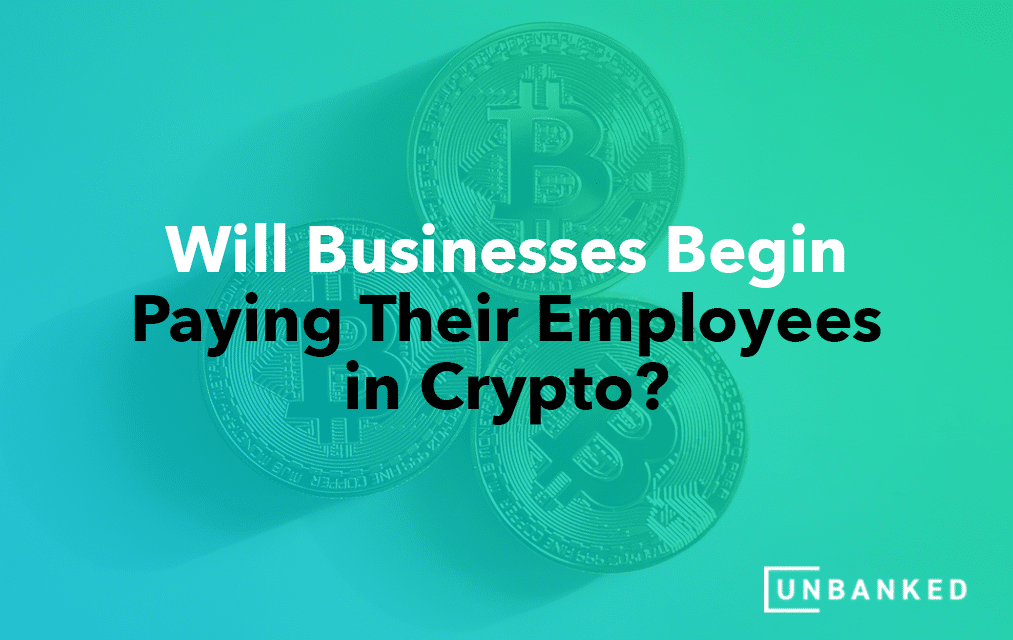Interest in cryptocurrencies is growing each day, especially with the spike in crypto prices earlier this year; everyone is talking about cryptocurrencies. This year has been a big one for crypto advocates and enthusiasts. The global pandemic coupled with market instability had led to constant fluctuation in the prices of fiat currencies. This is the reason why people have become more skeptical of centralized banks and are looking for alternative ways of investment and payment. Holding cryptocurrency can protect them from market inflation. Several companies and businesses have been accepting cryptocurrencies as a form of payment for their products and services. The mainstreaming of crypto has led to employers and employees looking at using cryptocurrencies as a form of payment. Employers who want to stay at the top of innovation and attract the best talent are already compensating their employees using cryptocurrencies in one way or the other. This year alone, Twitter, the City of Miami, the City of Jackson, TN, and the Sacramento Kings announced that they would explore the use of Bitcoin for payroll.
The benefits of paying in crypto include eliminating conversion costs and the centralized role of banks to get the money cleared. Since there are several international employees in a company, many of whom work online (given the pandemic), they don’t have to compromise for poor conversion rates. Instead, they can convert their digital currency into money at any given time when the exchange rates are good. Therefore, paying in cryptocurrencies will eliminate the processing and conversion fee for employees who work internationally. For example, Asta Solutions, a Melbourne-based technology consulting firm, announced in July 2021 that it would start offering its employees an option to be paid in Bitcoin. It collaborated with the Tasmanian company Get Paid in Bitcoin to allow its employees to receive a part of their salary in Bitcoin. Other Australian companies which have already done that are Finder (a FinTech company helping people with their finances), Living Room of Satoshi (a startup that allows Australians to pay bills using cryptocurrencies), and BTC Markets (a cryptocurrency exchange). However, payment in cryptocurrencies is not that straightforward, and there are several things a business needs to take under consideration while thinking about crypto as a payment option.
Legal Implications
The first thing that a business probably needs to consider before adopting crypto to pay their employees is the regulations in the region it is situated. In the US, for example, the Fair Labor Standards Act requires employers to pay their employees either in cash or an equivalent negotiable instrument. While most cryptocurrencies can be easily converted to cash, the US Department of Labor may not see it that way. Besides that, there are also state laws to be taken into consideration. Several US states like California, Washington, Georgia, Maryland, Delaware, Pennsylvania, Michigan, New Jersey, Texas, and Illinois require employers to pay their employees in the US dollar. In Georgia, this provision of US dollar payment does not apply to those employed in the farming, sawmill, or the turpentine sector or to salaried officials of a company, department heads, and superintendent. On the other hand, Texas allows employers to pay their employees in any other form (besides the US dollar) that has been well-agreed upon in writing by both parties.
Due to such federal and state regulations, employers in the US have to pay their employees their base salary and overtime in the US currency. Companies wanting to pay their employees in crypto have to adopt a hybrid approach in which they can offer the employee the minimum wage in US currency and then the additional in the form of crypto. Cryptocurrency can only be used for such payment if the employee authorizes the employer to do so (in the form of acknowledging the risks associated with crypto). Even then, the employers need to make sure that they are not breaching any federal, state, and local regulations.
Employees who receive payment in crypto have to be mindful of its taxable status. Cryptocurrency is considered a capital asset by the Internal Revenue Services, and therefore, everyone buying, selling, exchanging, or getting paid in cryptocurrency will be taxed accordingly. Many people are not aware of this, and therefore, a company needs to educate its employees about the current tax rules concerning cryptocurrency.
Future of Crypto Payroll
It takes a lot of work and preparation to institute a crypto payroll. There can be issues when paying in cryptocurrency, given the volatility of the crypto market. If the value of the coin goes up, employers might feel that they overpaid their employees, and if it goes down, the employees will feel underpaid. Earlier this year, an employee from an unnamed US-based company claimed that they were asked to return the cryptocurrency (received as a part of salary) after the prices of those cryptocurrencies rose by 700%. So even though the transactions are completely legal, the use of crypto for payment can cause tension between employers and employees.
Nonetheless, cryptocurrencies are becoming more and more mainstream and widely acceptable. This year WeWork, a commercial real estate company, announced that it would accept cryptocurrencies as a form of payment for its memberships. Partnering with Coinbase, the largest cryptocurrency exchange in the US, WeWork will pay landlords and third-party contractors in the form of cryptocurrencies. Even the US government is looking for options to utilize the potential of cryptocurrencies. In 2019, Ohio allowed companies to pay their taxes in the most widely accepted digital currency, i.e., bitcoin. States might likely follow this step to attract the best private companies. The current outlook of the US government on digital currency seems positive as it is also considering issuing its own digital dollar. As cryptocurrencies become popular both amongst the government and private businesses, paying salaries in crypto will become mainstream. And with the current rate, it seems that it will be in the near future.
At Unbanked, we believe greatly in the potential of cryptocurrencies to shape the future of several businesses and industries. To know more about how you can leverage the power of cryptocurrencies, visit our blog today!





